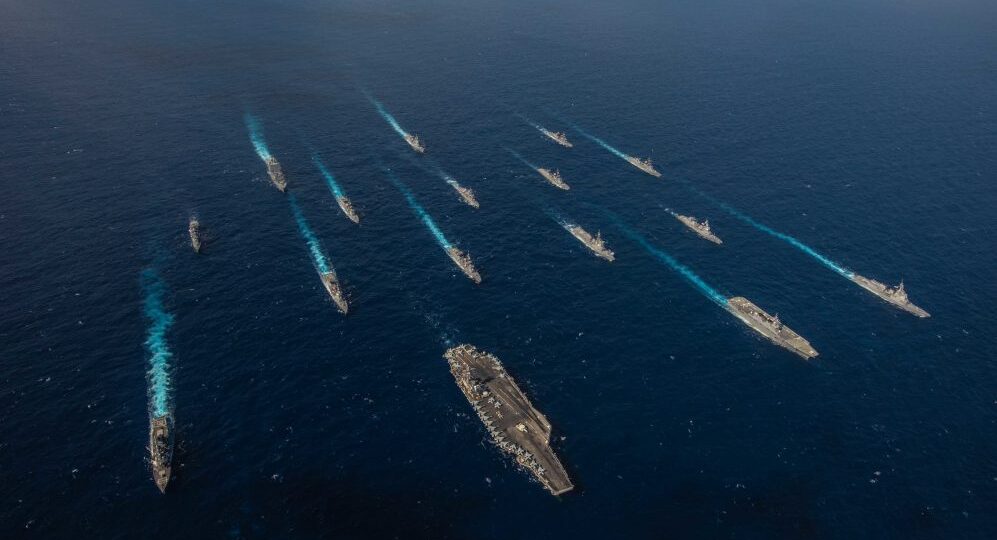Reports from Palau suggest the mood in government is disappointing. Why? The United States Congress missed the September 30, 2023, deadline to confirm the funding of the Federated States of Micronesia (FSM), the Marshall Islands, and Palau. These three island states are in the northern Pacific and have control over the air, sea, and land between Hawaii and the Philippines. In short, they constitute a strategic asset for the United States. Today, this second line of defense against China is up for grabs.
After World War II, the freshly liberated Micronesia islands were turned into a United Nations trust territory administered by the United States from 1947 to 1994—Trust Territory of the Pacific Islands (TTPI). In 1951, the US Department of the Interior took over management of the trust and transferred its headquarters from Honolulu to Guam and then Saipan. The TTPI divided Micronesia into six districts: the Marshalls, Ponape, Truk, Marianas, Yap, and Palau. In the 1970s and 1980s, the districts started to vote to end the relationship, which led the United Nations to dissolve the Trust Territory in 1990. Palau was the last to exit, voting to end its trustee status in 1994.
Currently, the former Trust Territory is comprised of four self-governing districts. On one hand is the Commonwealth of the Northern Marianas, which is an American commonwealth whose residents are US citizens. On the other hand are the three island-states known as the Federated States of Micronesia, the Republic of the Marshall Islands, and the Republic of Palau. These three island-states funding frameworks are referred to as the Compacts of Free Association (COFA) with the United States. These compacts provide for full self-government except for defense. These island economies, based on tourism and fisheries, are barely self-sustaining and will outsource their defense to the United States in return for economic support and other social benefits.
The Biden administration previously pledged $6–7 billion in economic aid over the next two decades. Congressional haggling, however, is delaying adoption of the economic assistance. The Marshall Islands also held up the process by asking for more funding in relation to the legacy of US nuclear testing in the Pacific. This issue is now resolved, with the Marshall Islands recently signing a 20-year agreement on October 16, 2023, for $2.3 billion. All three COFA members have signed and need congressional ratification.
The current 45-day continuing resolution recently passed by Congress does not fund the Biden administration’s COFA agreements. The situation is particularly dire for Palau due to its continuous support to Taiwan. The island-state has already lost the entire Chinese tourism market, with tourism revenue declining nearly 40 percent. In 2021, Finance Ministry records show that Palau ran a deficit of at least $37 million on a total budget of less than $150 million. In contrast, the island-state expected to receive $90 million from an extension of its compact for 2024. Since the agreement is not yet approved by Congress, Palau survives entirely on debt.
This cost is a drop in the bucket and a way to purchase American security on the cheap. Supporting COFA to deny Beijing access to the 5.6 million square kilometers of the Pacific Ocean controlled by these islands is well worth the investment. Indefinitely delaying COFA funding will kill the United States’ open-ended permission to build several military facilities in the island-states’ territory.
It is important to keep in mind that the United States already has a military base in the Marshall Islands, where, on Kwajalein Atoll, the Department of Defense tracks long-range intercontinental ballistic missiles test-fired from California. It is also where missile defense interceptors launched from Alaska are tracked.
More recently, at a base in Palau, the United States started the installation of an over-the-horizon radar system and is increasing military exercises over the island itself. Thus, pulling the rug from under the island’s leadership increases anxiety among the local population and casts a large shadow of doubt over the sincerity of American commitment. Congress needs to consider that, in the presence of an increasingly assertive China in the Pacific, security guarantees come as a package that also involves the modernization of these islands and outfitting their economies with digital and space-domain transition assets.
The Palau Cable 2 (PC2), for example, will connect Palau with Echo, a submarine optical cable linking Southeast Asia and the United States. The $30 million PC2 is funded by Australia, Japan, and the US under the Trilateral Partnership for Infrastructure Investment in the Indo-Pacific. When it comes to the island’s broader infrastructure, digital transformation is not scheduled to take place.
The Maldives, a small island nation similar to Palau, already has its own Maldives Space Research Organization. Palau cannot financially afford a program that would leverage earth observation and enhance the island’s economic sustainability and situational awareness. Security guarantees should include not only technology transfers and facilities investment, but also education and training, enabling economic transformation and mitigating Palau’s youth brain drain.
Meanwhile, in the southern half of the Pacific, China has concluded a security agreement with the Solomon Islands, including a policing pact. Local populations understand that China is “eager to help” their Pacific Island states. Both of these agreements are counter to American interests. Rather than deterring China, current congressional dysfunctionality is an invitation for China to take over.
The facts are simple. American dithering is putting the nation’s ability to effectively operate in and secure the vastness of the Pacific at risk. There is perhaps no more cost-effective way to advance Pacific security than for Congress to fund the Compacts of Free Association and related activities.
Christophe Bosquillon has over 30 years of international experience in general management, foreign direct investment, and private equity and fund management across various industries and is based 80 percent of the time in the Pacific Basin.


